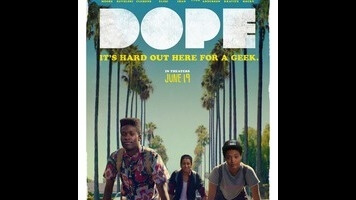Sundance breakout Dope is messy but energetic

Dope often brings to mind early Spike Lee, not because its characters represent a broad cross section of black life or because it’s fixated on the aesthetics of the Mars Blackmon era, but because writer-director Rick Famuyiwa seems to have opinions on everything from race to romance to politics, and treats filmmaking partly as an excuse to voice them. Topics include bitcoin, drone strikes, “praying away the gay,” phone tracking, the culture of college application essays, perceptions of blackness and authenticity, middle-class white attitudes toward sex, and what does and doesn’t constitute the Golden Age of rap. Buried somewhere in there is an over-burdened, overworked action-comedy premise about three teenage hip-hop geeks who get hold of a backpack full of powdered MDMA.
Best known for his 1999 debut feature The Wood, Famuyiwa is not a young filmmaker by most metrics, but his movie is animated by that hunger for self-expression that used to be taken for granted in up-and-coming indies, but is now rare. His hero is Malcolm Adekanbi (Shameik Moore), a Nigerian-American high school senior in the Los Angeles suburb of Inglewood, obsessed with early ’90s hip-hop and getting into Harvard. (It should be noted that Famuyiwa is also a Nigerian-American from Inglewood, and that most of Malcolm’s interests had their heyday when he was in high school.) Nursing a crush on Nakia (Zoë Kravitz), the on-and-off girlfriend of local drug dealer Dom (A$AP Rocky), he sneaks into Dom’s nightclub birthday party with best friends Diggy (Kiersey Clemons) and Jib (The Grand Budapest Hotel’s Tony Revolori), which ends with a shoot-out and Malcolm making off with several pounds of Dom’s product.
What follows is convoluted and sometimes confused, as Malcolm, Diggy, and Jib cross paths with Bloods, over-sexed rich kids, and knockoff handbag wholesalers, all the while trying to prepare their college applications. There are musical numbers (by Pharrell Williams), occasional explanatory voice-overs (by Forest Whitaker), and plenty of stylized social-media montages. (The montages don’t always work, though Dope does boast one of the more convincing fictional memes in filmdom, built around a bystander saying, “How am I supposed to eat my pound cake?” during a local news interview.) The humor is broad and often cartoonish, but that doesn’t preclude it from being occasionally incisive. Nor, for that matter, does Dope’s breathless messiness cancel out the charm of Famuyiwa’s quick-cut filmmaking, which syncretizes slick techniques and old-school tastes.
Dope has more characters and subplots than it knows what to do with, and its performances are all over the place, ranging from Clemons’ and Revolori’s charismatic turns as second-banana goofballs to Roger Guenveur Smith’s stylized impression of a local millionaire, so vampiric that he might as well be slathered in German Expressionist makeup. Even Moore swings from likable understatement to Jerry Lewis-level fidgetiness depending on the scene. Still, in an era full of indifferent, cookie-cutter indies, an excess of ideas and personality is hardly a bad thing.